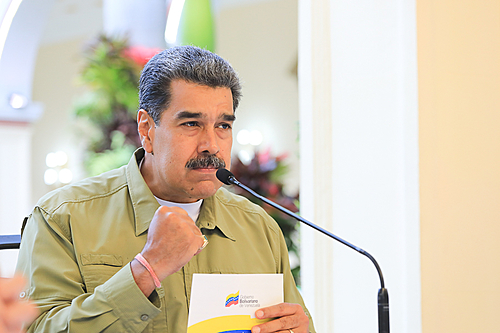
The government of Venezuela managed to release US$ 1.5 billion (about R$ 7.3 billion) that had been blocked at the Portuguese bank Novo Banco since 2019 due to sanctions imposed by the US and Portugal’s recognition of the extinct “government interim” by Juan Guaidó.
The decision was taken by the Lisbon Judicial Court on July 31, but was only released by the Venezuelan government on Wednesday afternoon (09).
The funds that will be unblocked were in several Novo Banco accounts on behalf of institutions and state-owned companies in Venezuela, such as the Economic and Social Development Bank (Bandes), the oil company PDVSA and several subsidiaries.
::What’s happening in Venezuela::
“This is the result of long work and, above all, the resistance of the Venezuelan people and the government of Nicolás Maduro, who do not allow themselves to be overcome by the threats of imperialism and the coup d’état,” wrote the Minister of Foreign Affairs of Venezuela, Yván Gil, on your social networks.
The oldest account dated from 2009 and the most recent from 2014. According to the court ruling, Novo Banco refused in August 2019 a series of withdrawal requests made by Venezuelan institutions claiming that it could not determine the legitimacy of the holders, i.e. , who could not say whether the accounts belonged to the Maduro government or Guaidó.
In addition, the court decision points out that the bank refused to carry out the withdrawal requests “alleging the political situation in Venezuela and the application of international sanctions to Venezuelan public entities, such as the executive orders issued by the president of the USA”.
::With Maduro, Lula criticizes US sanctions against Venezuela and defends the expansion of the Brics::
In 2021, during the pandemic, the United Nations asked financial entities and governments to release blocked Venezuelan resources so that the country could respond to the health emergency. Novo Banco then took the case to the Portuguese court, which has only now ruled in favor of Caracas.
The blockade of Venezuelan funds abroad began to occur in 2017, when former US President Donald Trump issued the first financial sanctions against Caracas. However, the practice has become common since former deputy Juan Guaidó proclaimed himself president of the country in 2019.
Recognition by the US and European countries of the so-called “interim government” – which ended in December 2022 – allowed banks and financial entities to freeze Venezuelan state accounts and, in some cases, deliver the funds to Guaidó and his allies.
::Colombia summit attracts US and EU, but immediate sanctions relief on Venezuela unlikely::
Currently, Caracas estimates that between 24 and 30 billion dollars are frozen in accounts abroad or in multilateral organizations such as the IMF, IDB and CAF.
The release of blocked funds is one of the government’s main demands in dialogue tables with the opposition. In November 2022, an agreement signed by both delegations provided for the release of 3 billion dollars that are under the control of the opponents, but Caracas denounces that, so far, the agreement has not been fulfilled.
Editing: Rodrigo Durão Coelho
Source: www.brasildefato.com.br

